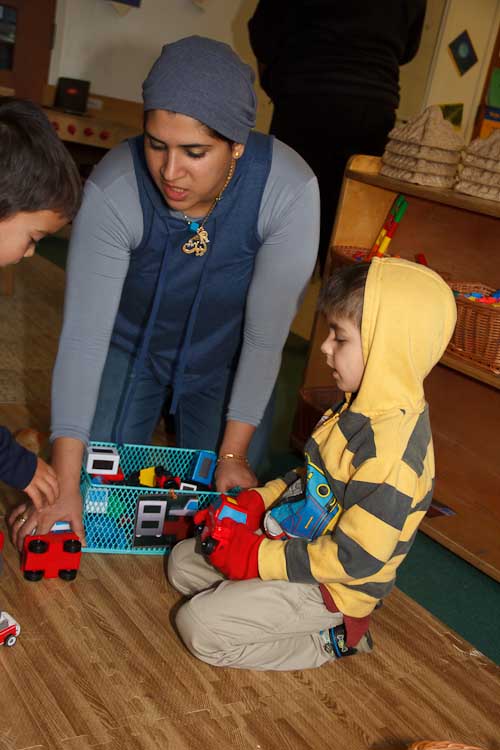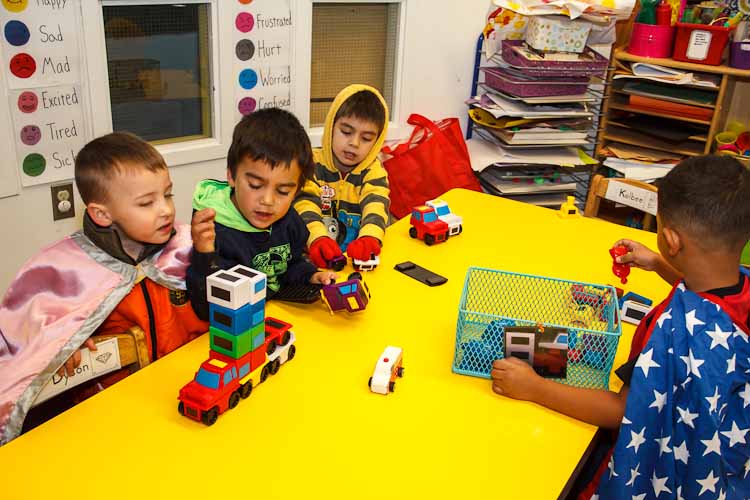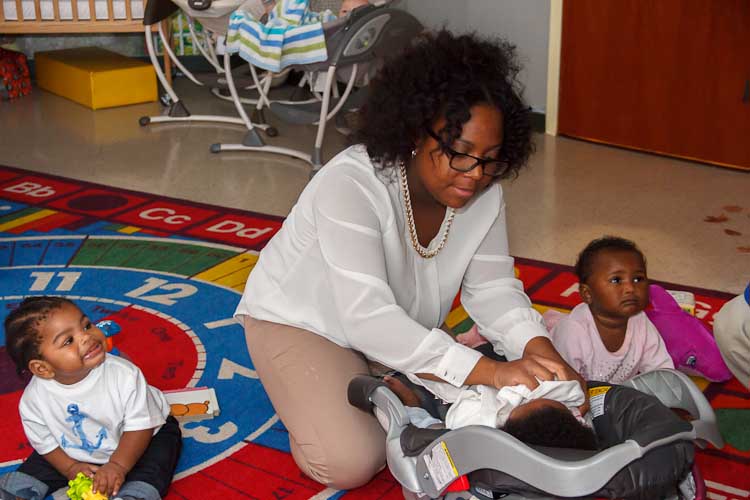Shared Alliance bolsters Battle Creek’s child care centers
Learning centers in Battle Creek are finding the advantages of working together.
High-quality child care is vital—to allow working parents to maintain their jobs and to prepare their children to succeed. But many child care centers and their directors are stretched thin. Through a shared alliance, three Battle Creek child care centers are getting support that boosts their ability provide high-quality care.
The Shared Service Alliance includes three centers: Woodlawn Preschool, Take a Break, and Garden of Dreams. They signed up to be part of the program and followed through with a grant application seeking funding. The alliance provides support, including assistance with administrative and financial issues. The centers share a classroom instructional coach, who works with directors to coach their staff, and a success coach, who works with all staff. The alliance is a member of the Southwest Michigan Employer Resource Network, which offers employers training and various types of support.
The alliance, which started in January, “allows for a different model of operating that shares the responsibility of the administrative functions,” says Maria Borden, co-executive director of BC Pulse, which supports the alliance. It “provides more stability,” she says.
Part of the goal is “to pull back-office support off of the child care centers so that they can focus on raising quality in their centers,” says Sarah LaGro of the Battle Creek Community Foundation, which serves as a hub for the alliance.
The alliance provides professional development, in the form of Child Development Associate and HighScope curriculum training, in collaboration with the Calhoun Intermediate School District.
The classroom instructional coach that the centers share “has a level of expertise and education that we don’t have the money to support financially, as an independent center,” says Andria Ryberg, executive director of Garden of Dreams. This coach helps the center’s staff be better at their jobs, which means the children will learn more—and more quickly, she says. Garden of Dreams has 74 children enrolled, and about 60 percent qualify for free or reduced lunch.
“We want to create an excellent early learning experience for a really diverse group of students. In order to support that, we have to be stable financially,” Ryberg says. “The childcare field is a difficult business field to be in. There’s limited opportunity for increasing your revenue because you can only charge families so much before they price out of what they can afford, and you only have limited slots.”
Through the alliance, Garden of Dreams has set goals for financial success, student growth success, and teacher support and growth. If each center is its own island, operating independently, it’s not as efficient as it can be, Ryberg says. The alliance staff also help the center directors develop as business, and pedagogical leaders.
The alliance’s success coach works on site to help employees solve various issues. “A lot of problems that come up with employees aren’t really work related, but they affect their ability to work,” says Kathy Olsen, marketing and community information coordinator for Michigan Works! Southwest.
“Many of the centers’ employees are making minimum wage and may experience problems that affect their ability to work: Is my car going to work? Am I going to have reliable daycare? I can’t buy groceries this week because something else happened,” says Mary Gehrig, who serves as a consultant to the alliance. “The success coach is there to help them solve those problems, and she has a wealth of information about our community and how to get support for them.”
“With all staff having a coach, and now a unified curriculum of ‘High Scope,‘ the quality will no doubt improve,” says Corinne Hastings, executive director of Woodlawn Preschool. “It certainly supports the director, staff, office staff, teachers, families, and quality for kids.” She notes that the alliance has also helped train substitute teachers for the center.

“Early learning—the first five years—is proven to be a really critical time for brain development,” Ryberg explains. “Ninety percent of your brain is formed in the first five years of your life, so you may not remember it, but what’s happening is really, really important to the rest of your life.”
Supporting teachers is essential, Ryberg says. “Having great teachers at the center—people that really care about the kids as if they’re their own children and are really interested in providing a strong education for them—that is what makes a center good or not.”
By streamlining operations, Ryberg hopes to save money and “put more of it toward our hard-working teachers,” she says. “This is a field that’s really run by women—traditionally by lower-income women—and the job is very challenging and requires a lot of skill.” She adds, “The women and men who work here do a really excellent job every day, and they deserve to have a job that is sustainable for them and one where they are making a living wage.”
Improving education has a broader impact on the community. “Having a stable child care where you know your child is loved and respected for who they are, and learning, is so critical to being able to do your job well,” Ryberg says.
Gehrig agrees. “Strengthening and growing child care centers is going to be very important to our community,” she says, noting that the alliance is working on getting three more centers to come on board.
Borden notes that shared service models are operating across the country, but only one or two are in Michigan. “Shared service models are necessary for many small institutions and organizations to keep their doors open,” she says.
Calhoun County center directors will be invited to a meeting on Nov. 29 to explain the process for bringing on new centers. The plan is to bring on three new centers in 2018 and three more in 2019
In the Employer Resource Network more broadly, the need for enough child care providers—and affordable care—is an issue that comes up often, Olsen says. “We’re trying to be innovative to address the childcare situation, especially for second shift and third shift.” That care is difficult to find, and the alliance is exploring ways it might be able to provide this care.
Allison Torres Burtka is a freelance writer in metro Detroit.
Photos by Susan Andress.
This article is part of Michigan Nightlight, a series of stories about the programs and people that positively impact the lives of Michigan kids. It is made possible with funding from the W.K. Kellogg Foundation. Read more in the series, here.


























